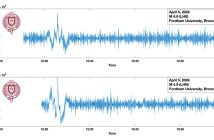A Fordham behavioral ecologist has uncovered evidence that suggests crocodiles swam across the Atlantic Ocean from Africa to establish their species in the Americas.
Evon Hekkala, Ph.D., assistant professor of biology, worked with colleagues at the University of California, Riverside and the American Museum of Natural History to examine the mitochondrial genes of most of the 12 species of true crocodiles within the genus crocodylus.
They discovered that the close genetic relationship between New World crocodiles and the Nile crocodiles of Africa indicates a very recent split, sometime between three and seven million years ago and well after the Atlantic Ocean reached its present width, Hekkala said.
“People talk about crocodiles as an ancient lineage that is static, like the dinosaur,” said Hekkala, a specialist in evolutionary biology and conservation genetics. “Our evidence suggests that the diversification in the true crocodile has arisen during the same period of time that modern humans arose, which is relatively recent, suggesting that the crocodile evolution is actually a very dynamic phenomenon.”
Because the Atlantic Ocean was approximately the same size at that time as it is today, the crocodiles’ sea journey could have taken some months, said Hekkala, and may have been helped along by equatorial currents.
Crocodiles can go up to a year without feeding, and are able to process salt water through special glands, she said. In addition, there is evidence that female crocodiles can store sperm for up to a couple of years.
The scientists’ evidence showed that a single lineage was established in the New World and then diversified into the current four Americas-based species.
“Many females could have made it and not successfully reproduced,” Hekkala said.
UC Riverside’s John Gatesy, Ph.D., associate professor of biology; his postdoctoral associate, Robert Meredith, Ph.D.; and George Amato, Ph.D., of the American Museum’s Sackler Institute for Comparative Genomics, conducted the study with Hekkala.
Their findings were featured recently in New Scientist magazine.


